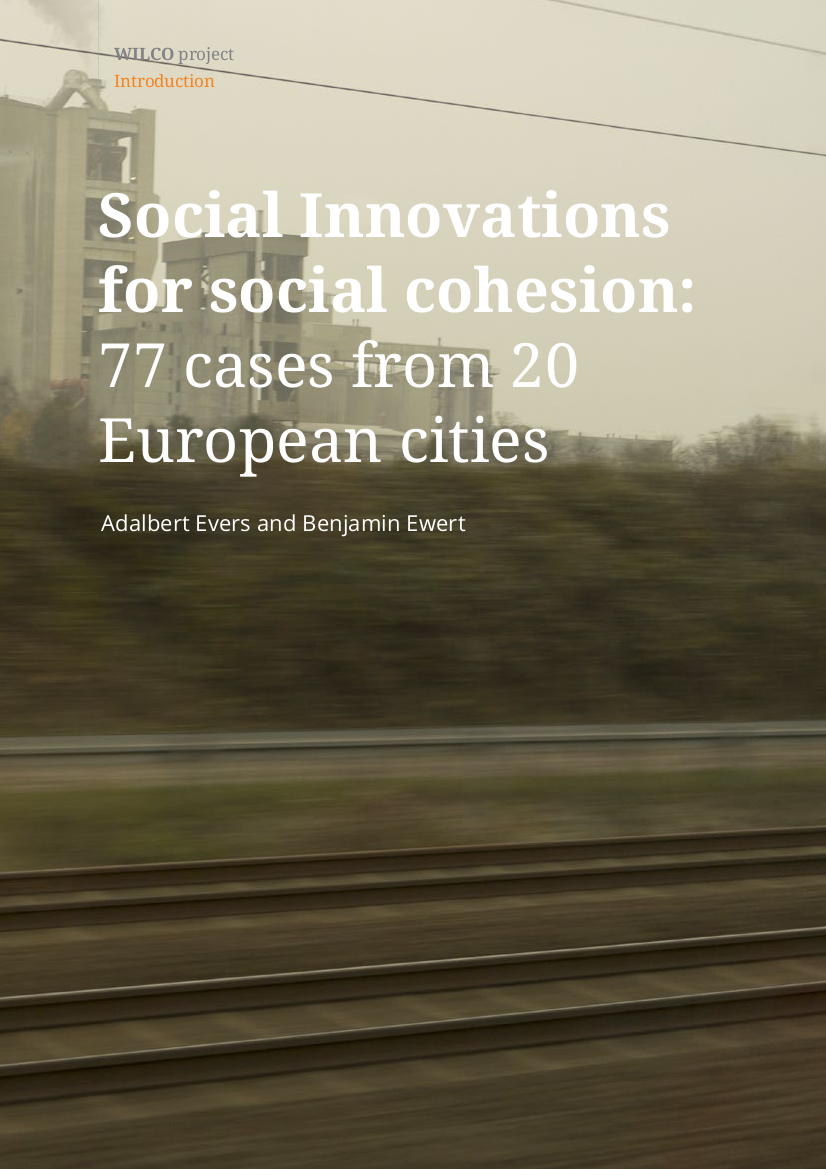The project entitled “Welfare innovation at the local level in favour of cohesion” (WILCO), funded by the 7th framework programme of the EU from 12/2010 to 1/2014, was given a double task:
- finding models, features and trends in local social innovation in support of social cohesion that appear across Europe despite national/local differences;
- looking at local contexts and welfare systems: what are key factors for diffusion and upgrading of such innovations?
In a nutshell, WILCO aimed to examine, through cross-national comparative research, how local welfare systems affect social inequalities and how they favour social cohesion, with a special focus on the missing link between innovations at the local level and their successful transfer to and implementation in other settings. Coordinated by Prof. Taco Brandsen from the Radboud University Nijmegen, WILCO’s researchers (over 30 researchers from ten countries) chose 20 European cities for investigation. Each country studied was represented by one big and one medium-size city.
This book builds on Work Package V, one of the central work packages of the WILCO project. The main objective of this part of the research project was to describe instruments and approaches that are used by innovatory social projects and networks to fight social inequality and stimulate social cohesion. Therefore the tasks convened upon in WP V were:
- to identify a number of cases of innovation in each of the cities to be studied and to describe their characteristics in a way that was conducive to finding out recurrent patterns of approaches and instruments used;
- to identify such recurrent approaches and instruments used in the innovative cases.
Read more
Download the Summary of Findings
Download the Report
Table of contents
Acknowledgements
Introduction – Social Innovations for social cohesion: 77 cases from 20 European cities
HR | Croatia
Zagreb
Introduction
Social mentoring project for employment of disadvantaged and marginalized groups
RODA – Parents in action
Public rental housing programme
Conclusions
Varazdin
Introduction
Public works Varaždin
Her Second Chance
Gardens of life
Non-profit housing organisation
Conclusions
FR | France
Lille
Introduction
Ilot Stephenson neighbourhood
Support for housing self-renovation in Lille Metropolis
Parler Bambins – Toddler Talk
Potes en Ciel – Children’s Café
Early childhood centre
Conclusions
Nantes
Introduction
Le temps pour toit – Time for Roof
Joint assessment of families’ needs and changes in child care provision for single-parent families
The Lieux Collectifs de Proximité network
Conclusions
DE |Germany
Friedrichshain – Kreuzberg (Berlin)
Introduction
Neighbourhood Management (NM)
Princesses Gardens
Job Explorer
Kreuzberg Acts
Neighbourhood Mothers
Family Centres
Conclusions
Münster
Introduction
MAMBA
Optionskommune
Prevention Visits
Family Office
Osthuesheide neighbourhood
Hafenforum
Conclusions
IT | Italy
Brescia
Introduction
Servizio per l’Inserimento Lavorativo, SAL – Employment Insertion Service
Bimbo chiama bimbo – Child calls child
“Via del Carmine 15” project
Fare e abitare – Doing and living project
Una casa in più – One house more project
Conclusions
Milan
Introduction
Fondazione Welfare Ambrosiano
Maggio 12 – Nuovo Manifesto Pedagogico per la Città
Fondazione Housing Sociale
Conclusions
NL | The Netherlands
Amsterdam
Introduction
Buurtbeheerbedrijven – Neighbourhood management companies
Buurtwinkels voor Onderzoek, Onderwijs en Talentontwikkeling, BOOT – Neighbourhood Stores for Education, Research and Talent Development
Buurtmoeders Catering – Neighbourhood
Mothers Catering
Conclusions
Nijmegen
Introduction
Work corporations
A Future for Everybody
Sirocco
Conclusions
PL | Poland
Warsaw
Introduction
MaMa Foundation
The Foundation for Development
Beyond Borders
Team for Solving Social Problems in the Field of Housing
Project “Become your own Boss in Poland”
Conclusions
Plock
Introduction
The Plock Council of Seniors
The Russian Community Association
City Social Housing Society
Project “Together for Revitalisation”
Foundation “Grant Fund for Plock”
Conclusions
ES | Spain
Barcelona
Introduction
La Mina Transformation Plan
Joves amb futur – Young People with a Future
Citizens’ Agreement for an Inclusive Barcelona
Conclusions
Pamplona
Introduction
Social integration enterprises and social clauses
Social integration housing
Casas Amigas
Neighbourhood children’s services
Conclusions
SE | Sweden
Stockholm
Introduction
The Filur Project
Barn till ensamma mammor – Children of single (lone) mothers, Fryshuset
Miljardprogrammet (The Billion Programme)
Conclusions
Malmö
Introduction
Områdesprogrammet in Holma-Kroksbäck
Coompanion Inkubatorn
Yalla Trappan, Rosengård
Conclusions
CH | Switzerland
Bern
Introduction
Primano
Integration guidelines
Professional integration and education for young mothers
Conclusions
Geneva
Introduction
The Unités d’Action Communautaire
The ORIF project
The Unit for Temporary Housing (ULT)
Conclusions
UK | United Kingdom
Birmingham
Introduction
A locality approach to unemployment
Youth Employment and Enterprise Rehearsal (YEER)
Lone parent support
Targeted discretionary housing payments (TDHP)
Birmingham Municipal Housing Trust (BMHT)
Conclusions
Dover
Introduction
Family Learning at the ANP
Happy Feet Pre-School
EKH
Conclusions
Index
List of tables and figures
Dimensions of innovations
Number of participants in public Works in Varaždin 2008-2012
Composition of Immobiliare Sociale Bresciana
Contracts in Via del Carmine 15, by number of months
Examples of work corporations in Nijmegen
Chain of support that accompanies children until kindergarten
The Office for Disability Insurance: Organisation of the 3 years training





